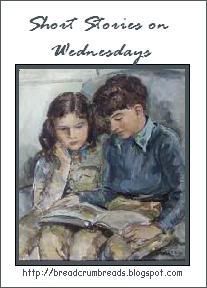Much as I loved Age of Innocence, I hadn’t read anything else by Edith Wharton until now. House of Mirth has been on my TBR list for ages but I just can’t seem to get to it. Wharton has a real talent for creating flesh and blood characters and her prose is a thing of beauty but she does love to ramble on a bit. That being the case, her short stories are a great way to enjoy her writing when you don’t have the leisure to delve into one of her novels. This week I read two of her short stories, one of which is a supernatural tale.
Afterward
"You won't know till afterward, you won't know till long, long afterward."
That’s what legend says about the ghost at Lyng house. Ned and Mary Boyne have left America to settle down to a harmonious life in England, thanks to a lucky windfall. The couple love all things old-worldly, including ghosts. Or so they think. Unfortunately, ghosts are not a quaint decor element as the Boyne’s find out.
Frankly, there wasn’t much of a surprise element to this ghostly tale. You could spot what’s coming a mile off. However, what it lacks in trick endings, it kind of makes up for with atmosphere and some well threshed out characters. As I mentioned before, brevity is not Wharton’s strong point and the lack of it is very evident here. I think this story could have been at least two pages shorter without losing anything. It might then have created a stronger tension which is so important in this genre. Not her best work but if you are in the mood for a softened ghost story without much blood-curdling going on, this is worth a read.
Souls Belated
Lydia belongs to a time and society that would forgive a murder sooner than they would forgive a divorce. A divorce is just what Lydia has gone thru but being a social pariah is not what pains her the most. It is the thought of being saddled onto Garret, her lover. The lovers had believed their love to be constant, unshakable and yet, here they were, unable to even look each other in the eye. Can marriage really bring two souls closer or is it better to part before the estrangement becomes even more painful?
Now this is where Edith Wharton really comes into her own. If you’ve read her novels, you know this is familiar territory to her. Affairs of the heart and the constraints of society are what she handles best. Wharton tells the story from Lydia’s perspective, and she tells it very well. Lydia’s helplessness, confusion and even hypocrisy are told most compassionately and without judgement. This story is classic Edith Wharton and if you enjoyed any of her novels, definitely read this.
Edith Wharton also wrote a lot of poetry which I'd never come across until now.I’m going to leave you with a slice of the poem A Torchbearer.
Great cities rise and have their fall; the brass
That held their glories moulders in its turn.
Hard granite rots like an uprooted weed,
And ever on the palimpsest of earth
Impatient Time rubs out the word he writ.
But one thing makes the years its pedestal,
Springs from the ashes of its pyre, and claps
A skyward wing above its epitaph—
The will of man willing immortal things.











